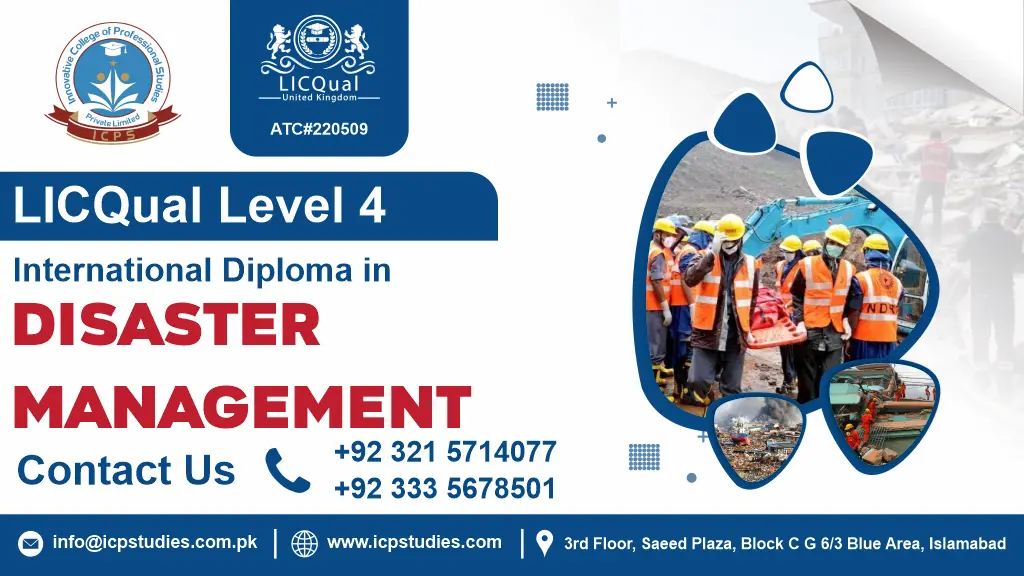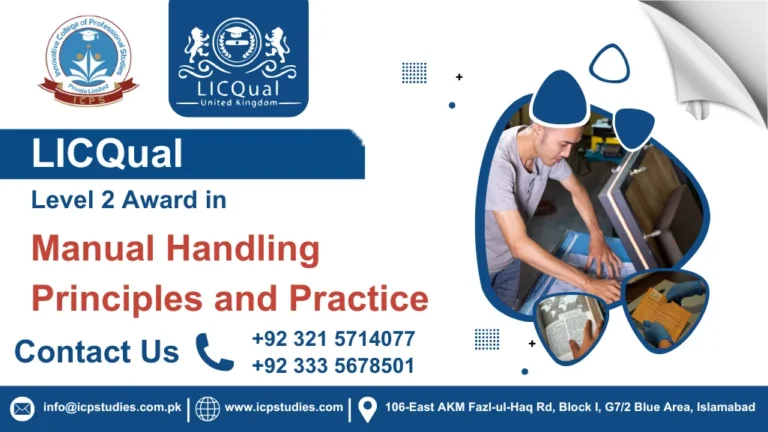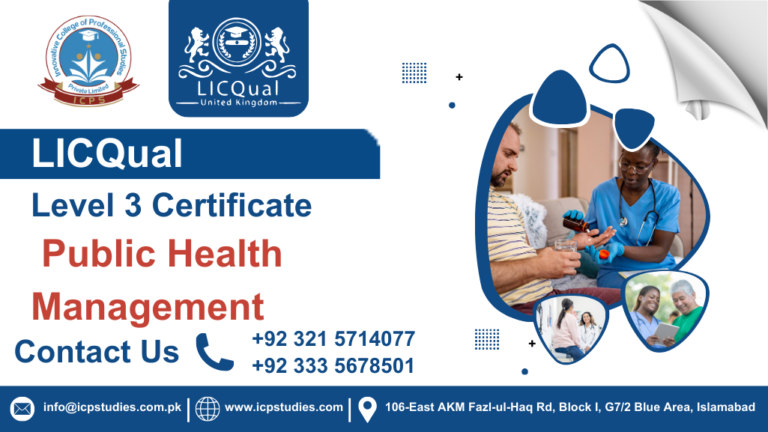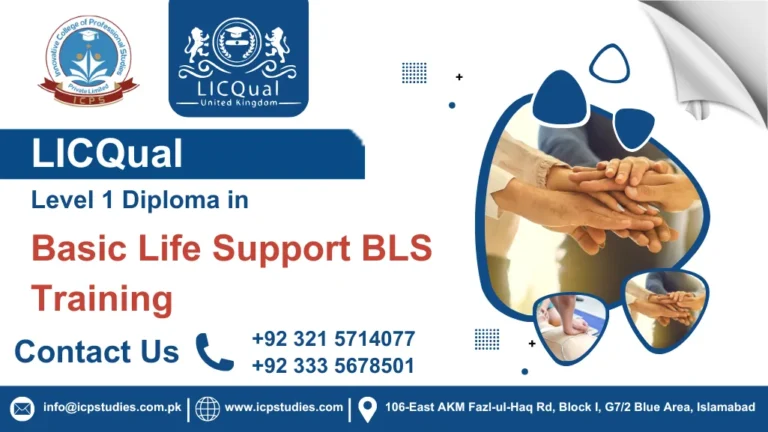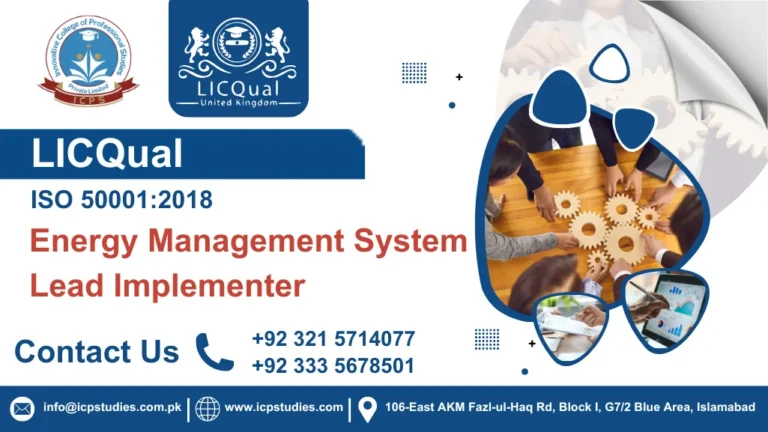Our diploma program covers all aspects of disaster management, from risk assessment and mitigation to emergency response and recovery strategies. You’ll delve into topics such as disaster preparedness, logistics management, humanitarian aid, and more, ensuring you have a well-rounded understanding of the field.
LICQual is a globally recognized accreditation body, meaning your diploma will be respected and valued by employers and organizations worldwide. Whether you’re seeking to advance your career or make a difference in humanitarian efforts across borders, this diploma opens doors to opportunities on a global scale.
We understand that many of our students have busy schedules and other commitments. That’s why we offer flexible study options, including online courses and part-time study plans, allowing you to balance your education with your existing responsibilities.
Don’t miss out on this opportunity to elevate your disaster management skills and make a meaningful difference in the world. Enroll now in the LICQual Level 4 International Diploma today and take the first step towards a rewarding and impactful career in disaster management. Together, we can build a safer, more resilient future for communities around the globe.
All About Level 4 International Diploma in Disaster Management
Course Overview
The LICQual Level 4 International Diploma in Disaster Management is a comprehensive educational program designed to provide participants with the knowledge, skills, and expertise needed to effectively manage and respond to disasters and emergencies on an international scale. This diploma course covers various aspects of disaster management, including preparedness, response, recovery, and mitigation strategies.
Participants learn how to develop and implement disaster preparedness plans tailored to different types of disasters, including natural disasters like earthquakes, hurricanes, floods, and man-made disasters such as industrial accidents or terrorist attacks. This section also covers risk assessment, early warning systems, and community resilience building.
Effective logistics and supply chain management are essential components of disaster response operations. Participants learn how to plan, procure, transport, and distribute essential supplies and resources in challenging environments, ensuring timely and efficient delivery to affected areas.
The LICQual Level 4 International Diploma in Disaster Management equips participants with the expertise and confidence to effectively manage disasters and emergencies, contribute to humanitarian efforts, and make a positive impact in communities around the world. Whether you’re a seasoned professional looking to enhance your skills or a newcomer to the field seeking to make a difference, this course provides a solid foundation for a career in disaster management.
Study Units
Learning Outcomes
Here are the expected outcomes for each study unit:
- Overview of Disaster Management:
- Understand the fundamental concepts and principles of disaster management.
- Gain insight into the historical context and evolution of disaster management practices.
- Identify key stakeholders and their roles in disaster management efforts.
- Recognize the importance of effective coordination and collaboration in disaster response and recovery.
- Disaster Management Approaches: Preparedness, Response, and Recovery:
- Differentiate between the various phases of disaster management: preparedness, response, and recovery.
- Learn how to develop and implement comprehensive disaster preparedness plans tailored to specific hazards and vulnerabilities.
- Acquire knowledge of effective response strategies, including incident command systems, resource management, and crisis communication.
- Understand the principles and practices of post-disaster recovery, including damage assessment, infrastructure restoration, and community rehabilitation.
- Natural Hazards and Resilient Communities:
- Identify common natural hazards and their potential impacts on communities and infrastructure.
- Explore strategies for building resilient communities that can withstand and recover from natural disasters.
- Understand the importance of risk assessment and mitigation in reducing vulnerability to natural hazards.
- Learn about community-based approaches to disaster risk reduction and the role of local knowledge and participation in resilience-building efforts.
- Geospatial Techniques in Disaster Management: A Critical Introduction:
- Gain a basic understanding of geospatial technologies and their applications in disaster management.
- Learn how geographic information systems (GIS), remote sensing, and spatial analysis can support disaster risk assessment, emergency response planning, and damage assessment.
- Explore case studies and examples of geospatial tools and techniques used in real-world disaster scenarios.
- Understand the limitations and challenges of geospatial technologies in disaster management and critically evaluate their use in different contexts.
- Leadership in Disaster Management:
- Develop leadership skills and competencies relevant to disaster management contexts.
- Learn how to effectively lead multidisciplinary teams and coordinate response efforts during emergencies.
- Understand the importance of communication, decision-making, and problem-solving in leadership roles.
- Explore ethical considerations and challenges faced by leaders in disaster situations, such as resource allocation and prioritization.
These outcomes collectively provide participants with a comprehensive understanding of disaster management principles, strategies, and tools, preparing them to contribute effectively to disaster response and recovery efforts in diverse contexts.
Admission Criteria
Here are the typical entry requirements for the LICQual Level 4 International Diploma in Disaster Management:
- Educational Background:
- A minimum of a high school diploma or equivalent is usually required to enroll in the course.
- Some institutions may have specific educational prerequisites, such as coursework in relevant fields like emergency management, geography, environmental science, or social sciences.
- Language Proficiency:
- Proficiency in the language of instruction (often English) is typically required. This may be demonstrated through standardized tests such as the TOEFL or IELTS for non-native English speakers.
- Language proficiency requirements may vary depending on the institution offering the course.
- Work Experience:
- While not always mandatory, some institutions may prefer applicants with relevant work experience in fields such as emergency management, disaster response, public health, humanitarian aid, or related areas.
- Work experience requirements, if any, may vary depending on the institution and the level of the course.
- Prerequisites or Preparatory Courses:
- Depending on the institution and the specific curriculum of the course, applicants may be required to complete certain prerequisite courses or preparatory modules to ensure they have foundational knowledge in relevant areas such as disaster management concepts, emergency response protocols, or geospatial technologies.
- Prerequisite requirements may vary, so applicants should carefully review the course prerequisites specified by the institution.
- References or Recommendations:
- Some institutions may require letters of recommendation or references from academic or professional sources attesting to the applicant’s qualifications, skills, and suitability for the course.
- Letters of recommendation should ideally come from individuals who can speak to the applicant’s academic abilities, work ethic, and potential for success in the field of disaster management.
- Interview or Statement of Purpose:
- Applicants may be required to participate in an interview or submit a statement of purpose outlining their motivation for pursuing the course, relevant experiences, career goals, and how they expect the course to contribute to their professional development.
- The interview or statement of purpose helps admissions committees assess applicants’ suitability for the course and their commitment to the field of disaster management.
These entry requirements serve to ensure that participants have the necessary background, skills, and motivation to successfully complete the course and contribute meaningfully to the field of disaster management. Prospective applicants should carefully review the specific requirements outlined by the institution offering the course and prepare their application accordingly.
Ideal Candidate
The LICQual Level 4 International Diploma in Disaster Management is designed for a diverse range of individuals who are passionate about making a difference in disaster response, preparedness, and recovery efforts. This course is particularly well-suited for:
- Professionals in the Field: Experienced emergency managers, disaster response coordinators, humanitarian aid workers, and government officials seeking to enhance their skills, knowledge, and credentials in disaster management.
- Aspiring Disaster Management Practitioners: Individuals who are new to the field of disaster management but are eager to enter this rewarding and impactful profession. This course provides a comprehensive foundation for those looking to build a career in emergency management, humanitarian assistance, or related fields.
- Public Health and Safety Professionals: Healthcare workers, public health officials, safety officers, and other professionals involved in ensuring the well-being and safety of communities during emergencies and disasters.
- NGO and Nonprofit Personnel: Staff and volunteers working for non-governmental organizations (NGOs), international aid agencies, and nonprofit organizations involved in disaster relief, recovery, and resilience-building initiatives.
- Military and Emergency Services Personnel: Military personnel, first responders, paramedics, firefighters, and other emergency services personnel looking to expand their expertise in disaster management and emergency response operations.
- Geospatial and Technology Experts: Professionals with backgrounds in geospatial sciences, geographic information systems (GIS), remote sensing, and related fields interested in applying their expertise to disaster risk assessment, mapping, and spatial analysis.
- Community Leaders and Advocates: Community leaders, activists, and advocates interested in promoting disaster preparedness, resilience-building, and community-based approaches to disaster management.
- Students and Researchers: Undergraduate and graduate students studying fields such as emergency management, geography, environmental science, public policy, sociology, or international development with an interest in disaster management research and practice.
This course welcomes individuals from diverse backgrounds and professions who share a common goal of improving disaster preparedness, response, and recovery efforts to protect lives, safeguard communities, and build resilience in the face of adversity. Whether you’re a seasoned professional seeking to advance your career or a newcomer looking to make a difference, this course provides valuable knowledge, skills, and opportunities for personal and professional growth in the field of disaster management.
FAQs for Level 4 International Diploma in Disaster Management

